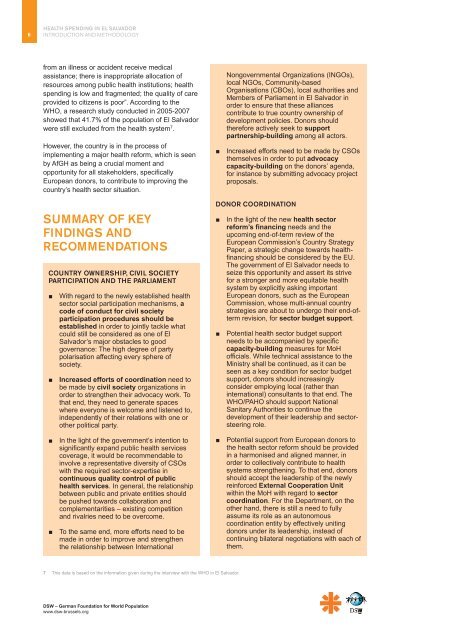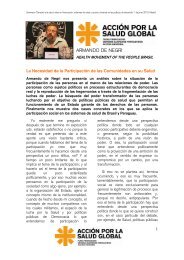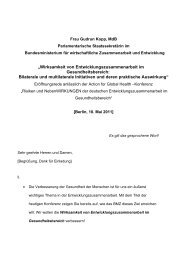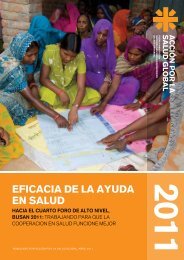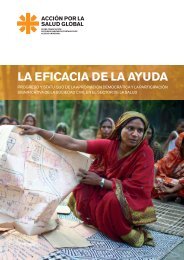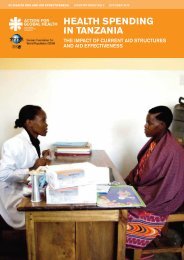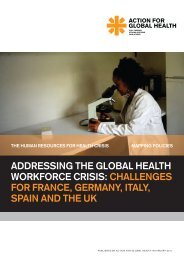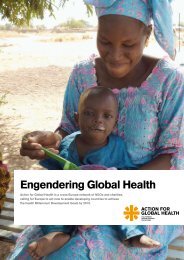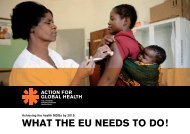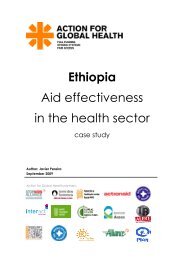HEALTH SPENDING IN EL SALVADOR - euroresources.org
HEALTH SPENDING IN EL SALVADOR - euroresources.org
HEALTH SPENDING IN EL SALVADOR - euroresources.org
You also want an ePaper? Increase the reach of your titles
YUMPU automatically turns print PDFs into web optimized ePapers that Google loves.
6<br />
<strong>HEALTH</strong> <strong>SPEND<strong>IN</strong>G</strong> <strong>IN</strong> <strong>EL</strong> <strong>SALVADOR</strong><br />
<strong>IN</strong>TRODUCTION AND METHODOLOGY<br />
from an illness or accident receive medical<br />
assistance; there is inappropriate allocation of<br />
resources among public health institutions; health<br />
spending is low and fragmented; the quality of care<br />
provided to citizens is poor”. According to the<br />
WHO, a research study conducted in 2005-2007<br />
showed that 41.7% of the population of El Salvador<br />
were still excluded from the health system 7 .<br />
However, the country is in the process of<br />
implementing a major health reform, which is seen<br />
by AfGH as being a crucial moment and<br />
opportunity for all stakeholders, specifically<br />
European donors, to contribute to improving the<br />
country’s health sector situation.<br />
SUMMARY OF KEY<br />
F<strong>IN</strong>D<strong>IN</strong>GS AND<br />
RECOMMENDATIONS<br />
COUNTRY OWNERSHIP, CIVIL SOCIETY<br />
PARTICIPATION AND THE PARLIAMENT<br />
■ With regard to the newly established health<br />
sector social participation mechanisms, a<br />
code of conduct for civil society<br />
participation procedures should be<br />
established in order to jointly tackle what<br />
could still be considered as one of El<br />
Salvador’s major obstacles to good<br />
governance: The high degree of party<br />
polarisation affecting every sphere of<br />
society.<br />
■ Increased efforts of coordination need to<br />
be made by civil society <strong>org</strong>anizations in<br />
order to strengthen their advocacy work. To<br />
that end, they need to generate spaces<br />
where everyone is welcome and listened to,<br />
independently of their relations with one or<br />
other political party.<br />
■ In the light of the government’s intention to<br />
significantly expand public health services<br />
coverage, it would be recommendable to<br />
involve a representative diversity of CSOs<br />
with the required sector-expertise in<br />
continuous quality control of public<br />
health services. In general, the relationship<br />
between public and private entities should<br />
be pushed towards collaboration and<br />
complementarities – existing competition<br />
and rivalries need to be overcome.<br />
■ To the same end, more efforts need to be<br />
made in order to improve and strengthen<br />
the relationship between International<br />
Nongovernmental Organizations (<strong>IN</strong>GOs),<br />
local NGOs, Community-based<br />
Organisations (CBOs), local authorities and<br />
Members of Parliament in El Salvador in<br />
order to ensure that these alliances<br />
contribute to true country ownership of<br />
development policies. Donors should<br />
therefore actively seek to support<br />
partnership-building among all actors.<br />
■ Increased efforts need to be made by CSOs<br />
themselves in order to put advocacy<br />
capacity-building on the donors’ agenda,<br />
for instance by submitting advocacy project<br />
proposals.<br />
DONOR COORD<strong>IN</strong>ATION<br />
■ In the light of the new health sector<br />
reform’s financing needs and the<br />
upcoming end-of-term review of the<br />
European Commission’s Country Strategy<br />
Paper, a strategic change towards healthfinancing<br />
should be considered by the EU.<br />
The government of El Salvador needs to<br />
seize this opportunity and assert its strive<br />
for a stronger and more equitable health<br />
system by explicitly asking important<br />
European donors, such as the European<br />
Commission, whose multi-annual country<br />
strategies are about to undergo their end-ofterm<br />
revision, for sector budget support.<br />
■ Potential health sector budget support<br />
needs to be accompanied by specific<br />
capacity-building measures for MoH<br />
officials. While technical assistance to the<br />
Ministry shall be continued, as it can be<br />
seen as a key condition for sector budget<br />
support, donors should increasingly<br />
consider employing local (rather than<br />
international) consultants to that end. The<br />
WHO/PAHO should support National<br />
Sanitary Authorities to continue the<br />
development of their leadership and sectorsteering<br />
role.<br />
■ Potential support from European donors to<br />
the health sector reform should be provided<br />
in a harmonised and aligned manner, in<br />
order to collectively contribute to health<br />
systems strengthening. To that end, donors<br />
should accept the leadership of the newly<br />
reinforced External Cooperation Unit<br />
within the MoH with regard to sector<br />
coordination. For the Department, on the<br />
other hand, there is still a need to fully<br />
assume its role as an autonomous<br />
coordination entity by effectively uniting<br />
donors under its leadership, instead of<br />
continuing bilateral negotiations with each of<br />
them.<br />
7 This data is based on the information given during the interview with the WHO in El Salvador.<br />
DSW – German Foundation for World Population<br />
www.dsw-brussels.<strong>org</strong>


